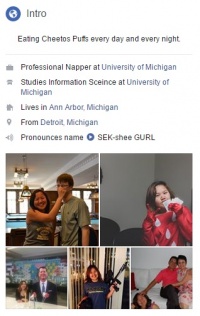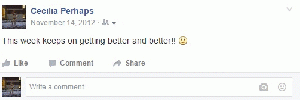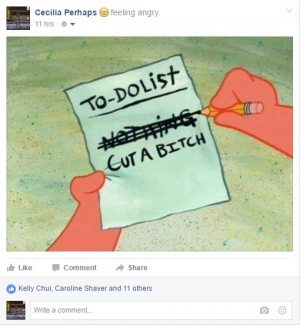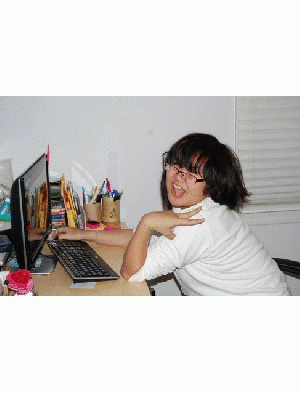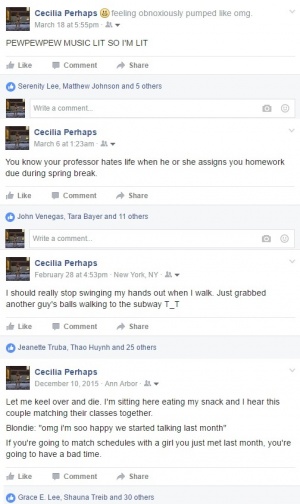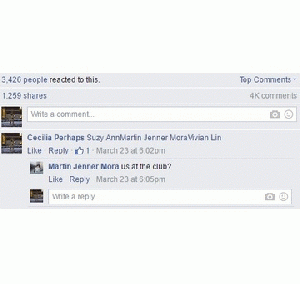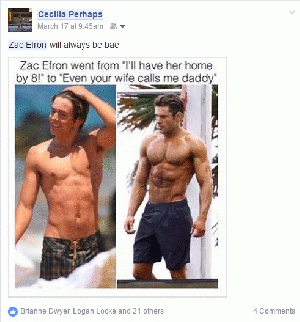Cecilia Ngo
Contents
The Origins
Originally under my legal name, Phuong-Cat Ngo, I started using Facebook in high school to be more connected with my friends. Facebook is a trendy website where not only can you post pictures, videos, and statuses, you can interact with your many friends on the website or play mini-games with each other. Phuong-Cat Ngo was the true and uncut version of me. The cynicism, angst and nerdy aspects of my life where out, displayed with little feedback. At this time, Facebook felt empty and I felt neglected by others. There was low amounts of comments, likes, and positive attention from the Facebook friends that I had in high school. Once I graduated from high school, I began to curate my posts to garner positive attention. I focused on what I posted and also who (and how much) I interacted with as well.
Who Am I? How am I Me?
Pictures
Given that my last name is Perhaps and not Ngo, I put more risque and controversial photos online. I feel a lot safer knowing that employers and other authorities cannot find me easily. From looking at my biography, it is shown that I mock the information and seriousness taken on Facebook. Perhaps that is why I am okay with revealing myself in less clothing given the fact that most of my information on my Facebook avatar is false. I am not a professional napper and Cecilia is not pronounced “SEK-shee GURL.” I’ve come to examine that pictures, used as a joke or not, are a staple to my identity. My photos, whether created by my or not, range from normal to ridiculous where there seems to be some positivity in them. Even when I have posts that shows snippets of my anger or hurt, I use comedy as a way to cope with it. However, my friends do not know that, instead, it projects me as someone who is carefree and humorous no matter the occasion.
Other photos I post are used to show how outrageous and hilarious I am. I want to be known as a spunky, carefree girl. I am successful by posting the events that I attend to and photos that I find humorous. Facebook is designed so that whenever I post a picture, it is assumed to be a glimpse of my life and ideas. The site is an interactive personal archive that others are able to sift through. As an archive and database, Facebook users are able to review my user-generated content that presents my identity in the form of snapshots of my life. The ethical concern, however, is to what context are these digital artifacts authentic? In some way or another, my pictures have an element of exaggeration. Indeed, it is valid that an event has happened or that my humor comes from my personality, but users do not know how much of that is true.
Statuses
With my desire to project myself as a funny person to hang out with, I post statuses from time to time about interesting events. Most, however, are laced with sarcasm or including a joke. At the same time, some are crass in language or in the subject matter. In some instances I post things that really move me and what I think are important, but these are seldom since little attention is gained from them. I’ve realized that I tend to post humorous things that can potentially numerous likes rather than posts that are more true to myself. The reason why I say “more true to myself” is because I am actually more cynical and dark compared to what is portrayed on Cecilia Perhaps. I want to be liked and more-received by others, and the way Facebook is designed in allowing feedback through likes, reactions, and comments allow me to customize it to my audience. Statuses created with great focus on who my online audience is. In some ways, there is a false sense of intimacy with the raw emotions I hold in posts that make me emotional where I implicitly call people to action with the anger or pity evoked in my circumstance. For the most part, statuses are rhetoric and provided for my audience as an amusing short written piece. My audience is demographically consists of young adults from the University of Michigan, so sarcasm and social injustice are woven into my posts.
Videos
Videos are integral to my identity as Cecilia Perhaps. They highlight my edginess and humor that I want to portray to my audience. While my pictures and statuses create my identity on Facebook, the videos I upload seal the deal to the audience. Where statuses and pictures create snapshots of my life that I want to show others, videos portray a moment of my life. With the way that Facebook is designed, videos are implied to be moments of importance that others should pay attention to more than photos and written posts. For that implicit nudge, I upload controversial and high-revealing videos such as pole dancing. In addition, I use videos to show my “best” jokes. Would I pole dance in public and to strangers? Of course not. Since I am known as Cecilia Perhaps, if a stranger finds my videos, I do not think much of it due to the falsity of my information. For my “best” jokes, they are actually my way to cope with high stress, anxiety, and sadness. Using humor, it looks like I am a jokster, but I am actually looking for instant gratification with likes and comments to know that someone is paying attention to me.
Other Parts of Me
Secondary elements of Facebook also yield to my production of Cecilia Perhaps. Presenting a popular, rebellious, and reckless student means that she must heavily active on Facebook interacting with others. I maintain this image of Ms. Perhaps by sharing funny articles, photos and videos. Other times, I comment on funny photos and videos with a name of another person. I want to mention as many diverse people within my Facebook friends list as I can. This allows me to look popular and close to those that I mentioned. Some interactions are crass, allowing to present Cecilia Perhaps as carefree and reckless.There is an ongoing joke about Cecilia Perhaps’s obsession of Zac Efron. Cecilia Ngo takes little effort in seeing his movies or videos. Cecilia Perhaps, however, incorporated him in many posts for comedic effect.
Conclusion
There is some truth in a joke, but the extent to which the joke is truthful is something disclosed to the jokester. The way that Facebook is designed allows improvement of my Cecilia show geared for more audience reaction rather than my own personal archive of fleeting moments in my life. With the interaction with others through the use of likes and comments, I’ve created a very open, friendly, and crass identity of myself online. At the same time, Cecilia Perhaps allows me to explore virtually online how controversial I can be and practice being comfortable in unwanted attention. Where online I am uncensored, I found myself to become more open about body, thoughts and who my friends to others and strangers than before. The self-authorship on Facebook allowed me to have a reformation of subjectivities. The ideas of truth and reality are skewed when creating an autobiography on Facebook. The numerical value of likes and comments on a post are designed in a way that users feel the desire to accumulate a high value in these user-generated feedback and do so by using exaggeration and depreciation of one’s truth. In a way, Facebook users are online caricatures of the real user, allowing for some truth within exaggerations which allow others to identify that one user as truly him or her. Cecilia Perhaps is me, but obscurely so.

